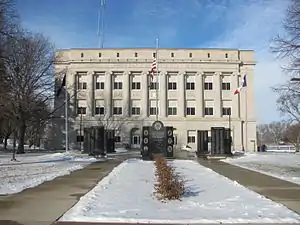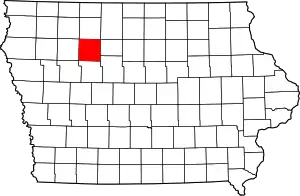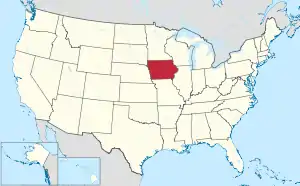Pocahontas County | |
|---|---|
 County Courthouse | |
 Location within the U.S. state of Iowa | |
 Iowa's location within the U.S. | |
| Coordinates: 42°44′04″N 94°40′39″W / 42.734444444444°N 94.6775°W | |
| Country | |
| State | |
| Founded | 1851 |
| Named for | Pocahontas |
| Seat | Pocahontas |
| Largest city | Pocahontas |
| Area | |
| • Total | 579 sq mi (1,500 km2) |
| • Land | 577 sq mi (1,490 km2) |
| • Water | 1.4 sq mi (4 km2) 0.2% |
| Population (2020) | |
| • Total | 7,078 |
| • Density | 12/sq mi (4.7/km2) |
| Time zone | UTC−6 (Central) |
| • Summer (DST) | UTC−5 (CDT) |
| Congressional district | 4th |
| Website | pocahontascounty |
Pocahontas County is a county located in Iowa, United States. As of the 2020 census the population was 7,078, making it the state's ninth-least populous county.[1] The county seat is Pocahontas.[2] The county was formed in 1851.[3]
The county is named in honor of Pocahontas, the famous Native American woman from Jamestown, Virginia. A colossal statue of her stands in the city of Pocahontas.[3]
Geography
According to the U.S. Census Bureau, the county has a total area of 579 square miles (1,500 km2), of which 577 square miles (1,490 km2) is land and 1.4 square miles (3.6 km2) (0.2%) is water.[4]
Major highways
Adjacent counties
- Palo Alto County (north)
- Humboldt County (east)
- Webster County (southeast)
- Calhoun County (south)
- Buena Vista County (west)
Demographics
| Census | Pop. | Note | %± |
|---|---|---|---|
| 1860 | 103 | — | |
| 1870 | 1,446 | 1,303.9% | |
| 1880 | 3,713 | 156.8% | |
| 1890 | 9,553 | 157.3% | |
| 1900 | 15,339 | 60.6% | |
| 1910 | 14,808 | −3.5% | |
| 1920 | 15,602 | 5.4% | |
| 1930 | 15,687 | 0.5% | |
| 1940 | 16,266 | 3.7% | |
| 1950 | 15,496 | −4.7% | |
| 1960 | 14,234 | −8.1% | |
| 1970 | 12,729 | −10.6% | |
| 1980 | 11,369 | −10.7% | |
| 1990 | 9,525 | −16.2% | |
| 2000 | 8,662 | −9.1% | |
| 2010 | 7,310 | −15.6% | |
| 2020 | 7,078 | −3.2% | |
| U.S. Decennial Census[5] 1790-1960[6] 1900-1990[7] 1990-2000[8] 2010-2018[9] | |||

2020 census
The 2020 census recorded a population of 7,078 in the county, with a population density of 12.2213/sq mi (4.7187/km2). 95.79% of the population reported being of one race. There were 3,666 housing units, of which 3,090 were occupied.[1]
| Race | Num. | Perc. |
|---|---|---|
| White (NH) | 6,383 | 90.2% |
| Black or African American (NH) | 66 | 0.9% |
| Native American (NH) | 10 | 0.14% |
| Asian (NH) | 29 | 0.41% |
| Pacific Islander (NH) | 23 | 0.32% |
| Other/Mixed (NH) | 213 | 3% |
| Hispanic or Latino | 354 | 5% |
2010 census
The 2010 census recorded a population of 7,310 in the county, with a population density of 12.654/sq mi (4.886/km2). There were 3,794 housing units, of which 3,233 were occupied.[11]
2000 census

As of the census[12] of 2000, there were 8,662 people, 3,617 households, and 2,430 families residing in the county. The population density was 15 people per square mile (5.8 people/km2). There were 3,988 housing units at an average density of 7 units per square mile (2.7 units/km2). The racial makeup of the county was 98.49% White, 0.24% Black or African American, 0.17% Native American, 0.17% Asian, 0.01% Pacific Islander, 0.30% from other races, and 0.61% from two or more races. 0.89% of the population were Hispanic or Latino of any race.
There were 3,617 households, out of which 29.50% had children under the age of 18 living with them, 58.30% were married couples living together, 5.90% had a female householder with no husband present, and 32.80% were non-families. 30.20% of all households were made up of individuals, and 17.80% had someone living alone who was 65 years of age or older. The average household size was 2.35 and the average family size was 2.91.
In the county, the population was spread out, with 25.40% under the age of 18, 5.30% from 18 to 24, 23.40% from 25 to 44, 24.10% from 45 to 64, and 21.70% who were 65 years of age or older. The median age was 42 years. For every 100 females there were 96.60 males. For every 100 females age 18 and over, there were 93.20 males.
The median income for a household in the county was $33,362, and the median income for a family was $40,568. Males had a median income of $27,929 versus $20,515 for females. The per capita income for the county was $17,006. About 6.60% of families and 9.10% of the population were below the poverty line, including 12.30% of those under age 18 and 6.50% of those age 65 or over.
Communities
Cities
Unincorporated communities
Townships
Population ranking
The population ranking of the following table is based on the 2020 census of Pocahontas County.[1]
† county seat
| Rank | City/Town/etc. | Municipal type | Population (2020 Census) |
|---|---|---|---|
| 1 | † Pocahontas | City | 1,867 |
| 2 | Laurens | City | 1,264 |
| 3 | Fonda | City | 636 |
| 4 | Rolfe | City | 509 |
| 5 | Gilmore City (partially in Humboldt County) | City | 217 (487 total) |
| 6 | Palmer | City | 138 |
| 7 | Havelock | City | 130 |
| 8 | Varina | City | 68 |
| 9 | Plover | City | 50 |
Politics
Between 1928 and 2004, Pocahontas County was a reliable bellwether county, backing the nationwide winner in every election except for 1960 (by only 37 votes) and 1988. The county has taken a rightward turn in the 21st century. After backing George W. Bush in 2000 and 2004, John McCain in 2008, and Mitt Romney in 2012 by sizable but not huge margins, Pocahontas County swung even further right in 2016. Donald Trump took nearly 70% of the vote share in the county and won the county by an astounding 45% margin. Trump further increased these numbers in 2020, winning almost 74% of the county's vote and increasing his margin of victory to just under 50%, both records for Pocahontas County for any candidate since the beginning of the 20th century.
| Year | Republican | Democratic | Third party | |||
|---|---|---|---|---|---|---|
| No. | % | No. | % | No. | % | |
| 2020 | 2,826 | 73.92% | 933 | 24.40% | 64 | 1.67% |
| 2016 | 2,702 | 69.91% | 963 | 24.92% | 200 | 5.17% |
| 2012 | 2,396 | 59.42% | 1,523 | 37.77% | 113 | 2.80% |
| 2008 | 2,138 | 53.29% | 1,800 | 44.87% | 74 | 1.84% |
| 2004 | 2,441 | 56.60% | 1,822 | 42.24% | 50 | 1.16% |
| 2000 | 2,242 | 54.14% | 1,736 | 41.92% | 163 | 3.94% |
| 1996 | 1,707 | 40.50% | 1,981 | 47.00% | 527 | 12.50% |
| 1992 | 1,743 | 37.33% | 1,919 | 41.10% | 1,007 | 21.57% |
| 1988 | 1,871 | 40.22% | 2,722 | 58.51% | 59 | 1.27% |
| 1984 | 2,627 | 50.64% | 2,481 | 47.82% | 80 | 1.54% |
| 1980 | 3,194 | 56.17% | 1,959 | 34.45% | 533 | 9.37% |
| 1976 | 2,700 | 45.85% | 3,055 | 51.88% | 134 | 2.28% |
| 1972 | 3,138 | 57.19% | 2,241 | 40.84% | 108 | 1.97% |
| 1968 | 2,940 | 52.56% | 2,364 | 42.26% | 290 | 5.18% |
| 1964 | 2,079 | 34.24% | 3,988 | 65.68% | 5 | 0.08% |
| 1960 | 3,445 | 50.23% | 3,408 | 49.69% | 6 | 0.09% |
| 1956 | 3,606 | 52.89% | 3,201 | 46.95% | 11 | 0.16% |
| 1952 | 4,472 | 61.73% | 2,517 | 34.74% | 256 | 3.53% |
| 1948 | 2,397 | 39.61% | 3,500 | 57.84% | 154 | 2.55% |
| 1944 | 2,600 | 41.94% | 3,577 | 57.70% | 22 | 0.35% |
| 1940 | 2,985 | 41.92% | 4,118 | 57.83% | 18 | 0.25% |
| 1936 | 2,277 | 33.39% | 4,357 | 63.89% | 185 | 2.71% |
| 1932 | 1,800 | 28.48% | 4,245 | 67.16% | 276 | 4.37% |
| 1928 | 3,322 | 53.75% | 2,824 | 45.70% | 34 | 0.55% |
| 1924 | 2,537 | 39.65% | 819 | 12.80% | 3,042 | 47.55% |
| 1920 | 4,046 | 70.07% | 1,639 | 28.39% | 89 | 1.54% |
| 1916 | 1,808 | 51.29% | 1,658 | 47.04% | 59 | 1.67% |
| 1912 | 760 | 22.95% | 1,176 | 35.52% | 1,375 | 41.53% |
| 1908 | 1,857 | 57.42% | 1,315 | 40.66% | 62 | 1.92% |
| 1904 | 2,175 | 66.09% | 976 | 29.66% | 140 | 4.25% |
| 1900 | 2,176 | 61.84% | 1,287 | 36.57% | 56 | 1.59% |
| 1896 | 1,866 | 56.82% | 1,377 | 41.93% | 41 | 1.25% |
See also
References
- 1 2 3 "2020 Census State Redistricting Data". census.gov. United states Census Bureau. Retrieved August 12, 2021.
- ↑ "Find a County". National Association of Counties. Retrieved June 7, 2011.
- 1 2 History Archived 2010-10-21 at the Wayback Machine, Pocahontas County Economic Development.
- ↑ "US Gazetteer files: 2010, 2000, and 1990". United States Census Bureau. February 12, 2011. Retrieved April 23, 2011.
- ↑ "U.S. Decennial Census". United States Census Bureau. Retrieved July 20, 2014.
- ↑ "Historical Census Browser". University of Virginia Library. Retrieved July 20, 2014.
- ↑ "Population of Counties by Decennial Census: 1900 to 1990". United States Census Bureau. Retrieved July 20, 2014.
- ↑ "Census 2000 PHC-T-4. Ranking Tables for Counties: 1990 and 2000" (PDF). United States Census Bureau. Archived (PDF) from the original on March 27, 2010. Retrieved July 20, 2014.
- ↑ "State & County QuickFacts". United States Census Bureau. Archived from the original on November 29, 2015. Retrieved July 20, 2014.
- ↑ "P2 HISPANIC OR LATINO, AND NOT HISPANIC OR LATINO BY RACE – 2020: DEC Redistricting Data (PL 94-171) – Pocahontas County, Iowa".
- ↑ "Iowa:2010 Population & Housing Occupancy Status" (PDF). United States Census Bureau. Archived (PDF) from the original on October 16, 2020. Retrieved August 15, 2022.
- ↑ "U.S. Census website". United States Census Bureau. Retrieved January 31, 2008.
- ↑ Leip, David. "Dave Leip's Atlas of U.S. Presidential Elections". uselectionatlas.org. Retrieved August 15, 2022.
External links
- Pocahontas County Economic Development Commission
- . The American Cyclopædia. 1879.
- The Pioneer History of Pocahontas County, Iowa (1902), a county history by Robert E. Flickinger